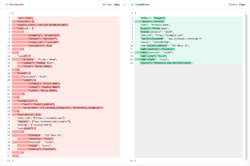overturetoosm
| overturetoosm | ||||||||||||||||||||
|---|---|---|---|---|---|---|---|---|---|---|---|---|---|---|---|---|---|---|---|---|
| Author: | whammo | |||||||||||||||||||
| License: | MIT License | |||||||||||||||||||
| Status: | Active | |||||||||||||||||||
| Website: | https://pypi.org/project/overturetoosm/ | |||||||||||||||||||
| Source code: | https://github.com/whubsch/overturetoosm | |||||||||||||||||||
| Programming language: | Python | |||||||||||||||||||
|
Convert Overture tags to OSM |
||||||||||||||||||||
| ||||||||||||||||||||
overturetoosm is a Python package to help a user convert Overture's map schema for use in OpenStreetMap. The package flattens Overture's nested schema, translates tags, and renames keys to OSM standards. It also removes much of the extraneous details Overture's database contain. Only the places layer is currently supported. The package works best with GeoJSONs (including being able to process whole file contents) and was designed to work seamlessly with the Overture project's overturemaps Python package.
The existence of this package and/or your usage of it does not absolve you of the need to adhere to the Import guidelines. Documentation for the project is available at the GitHub project's Page.
Contributing
Feel free to submit issues or pull requests on GitHub. If you want to expand the Overture categories that the package converts, the best way to do that is to edit the Overture categories page on the wiki. As of last testing, the existing tag conversions used by this project covered the top-level Overture category on about 80% of objects in an urban, North American environment.
